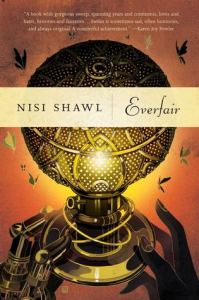Title: Everfair
Author: Nisi Shawl
Genre: Alternate History
Trigger Warnings: Racism, racist violence, slavery, forced labor, torture, blood, gore, violence against children, implied sexual content
Read To: 38%
Back Cover:
Everfair is a wonderful Neo-Victorian alternate history novel that explores the question of what might have come of Belgium’s disastrous colonization of the Congo if the native populations had learned about steam technology a bit earlier. Fabian Socialists from Great Britian join forces with African-American missionaries to purchase land from the Belgian Congo’s “owner,” King Leopold II. This land, named Everfair, is set aside as a safe haven, an imaginary Utopia for native populations of the Congo as well as escaped slaves returning from America and other places where African natives were being mistreated.
Shawl’s speculative masterpiece manages to turn one of the worst human rights disasters on record into a marvelous and exciting exploration of the possibilities inherent in a turn of history. Everfair is told from a multiplicity of voices: Africans, Europeans, East Asians, and African Americans in complex relationships with one another, in a compelling range of voices that have historically been silenced. Everfair is not only a beautiful book but an educational and inspiring one that will give the reader new insight into an often ignored period of history.
Review:
I wasn’t really vibing with this book even from the beginning, but when I paused it at the end of the workday I figured I was close to the end and I was legitimately going to finish it. Then I checked my progress and realized I wasn’t even close to halfway done.
Problem 1: Mismarketing
Every book starts with a “what if.” Usually it’s something like “what if there was a character with this particular trait or ability,” or “what if there was a world where such-and-such happened.” Everfair‘s marketing made it into a steampunk anti-colonialist adventure: “What if the people of the Congo developed steam power first and threw out the Belgians?” But the reality is more along the line of, “What if white saviors created a country in Africa that the poor Congolese could escape to, and also a white family lived there?”
There were some little bits of cool steampunk-esque technology (none of the technology created in Everfair, the country that got created, was actually powered by steam, but the asthetics were similar to steampunk), but it wasn’t an integral part of the setting. Or an integral part of anything, really. They just had some people in Everfair who were good at engineering stuff and that’s what they came up with. This is not a steampunk book, and it’s not about the Congolese discovering steam power and throwing out the Belgian colonizers. If anything, it’s an alternate history family epic that happens to be set in another European colony in Africa – even if this particular colony is more interested in being white saviors than exploiting the land and people.
Problem 2: Poorly Paced
The pacing in this book is … absent. There’s an event, and an event, and another event, and they’re all laid out for you one after the other even though there was two months between events one and two and four years between events two and three. There were dates interspersed periodically that I think were supposed to give a sense of temporality and time passing, but they didn’t work. I had no idea when anything was going on and no clue about the chronology of this story.
Problem 3: Ensemble Cast
An ensemble cast isn’t always bad, if you can do it well. This book did not do it well. The book opens with a fairly nonsensical scene of Lisette, a 15-year-old French girl, riding a bicycle, immediately followed by a three-year time jump with no mention or warning to her eloping with a married Englishman. It seemed to be setting her up as the main character. But, no. Besides her, other major characters include the Englishman’s wife Daisy and the fourth member of their poly quad whose name I forget, their four children, an African American preacher, an African American missionary lady and her two godsons (or maybe nephews), Jackie the English socialist, Tink the East Asian engineer in Everfair, King Mwendi (it was never really clear what he was the king of – I think a tribe of native Congolese?), and his favorite wife Queen Josina.
Count them – that’s 15 major characters. I’m not even mentioning the minor ones! With so many different people doing things, none of them got enough time on the page to even establish much about who they are, let alone make me feel any sort of connection to them or care about what happened to them.
Redeeming Qualities
This book was not 100% terrible. I don’t think any books are. So here are a few of the things I did like about it.
- The Belgian colonization and terrorization of the Congo isn’t a well-known event or a common setting for fiction, so props for uniqueness there.
- Very racially diverse cast of characters – not just African and white, but also East Asian, mixed race, and African American. Plus the majority of the book takes place in Africa.
- Polyamory rep. (It ends pretty badly, but it was pretty cool to start the book and find a seemingly happy poly relationship.)
- Plenty of romantic pining between two women.
- Totally awesome African queen who I wish had more page time because she was probably my favorite character.
Perhaps the white people making their own country to save (physically and spiritually, there was a strong Christian missionary angle that I did not like) the people suffering under Belgian rule is more realistic to actual history. But when I’m going into an alternate history, I expect a fantasy, especially if it promises me steampunk. I got none of that in this book. And combined with characters I didn’t see enough to connect with, it was just a disappointment.

